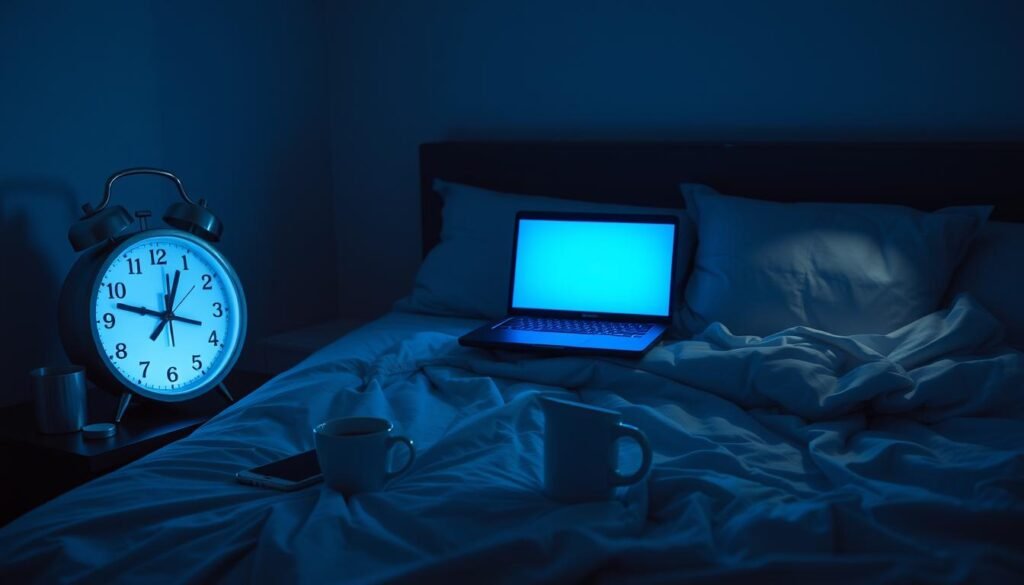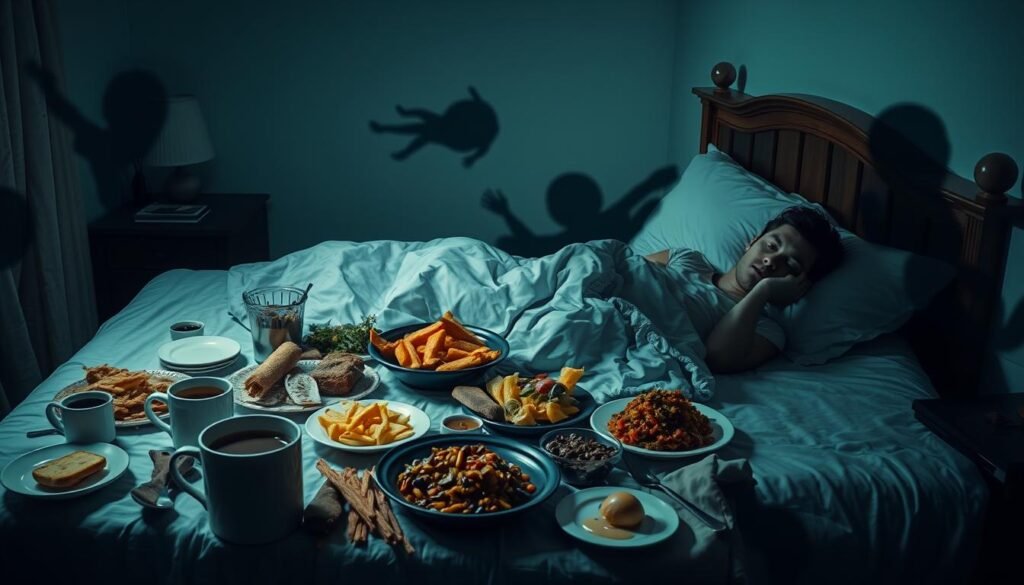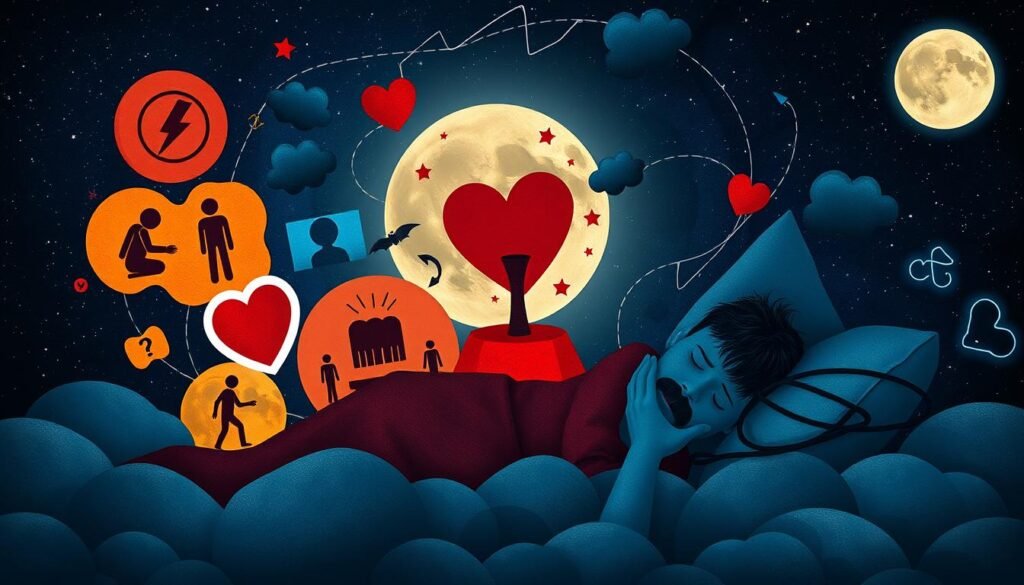About 30% of adults have insomnia symptoms. This shows how common this sleep problem is. It affects people and society deeply. Insomnia makes it hard to fall asleep, stay asleep, or causes early waking. Most people need 7 to 9 hours of sleep. Yet, many fail to get this crucial rest.
There are many causes of sleeplessness. Knowing them helps tackle insomnia. Chronic insomnia lasts over three months. It can harm our health in many ways. It touches on everything from job performance to mental well-being. Understanding the main reasons for insomnia is key to better sleep.
This article will explore insomnia’s facets. We will look into its symptoms, what triggers it, and its causes. These include both body and mind issues. We aim to show how to get better sleep for a healthier life.
Key Takeaways
- About 30% of adults experience insomnia symptoms, affecting daily life.
- Chronic insomnia lasts for over three months and can lead to health issues.
- Common insomnia causes include both physical and psychological factors.
- Disrupted circadian rhythms are prevalent among those with insomnia.
- Insomnia significantly impacts productivity and mental well-being.
Understanding Insomnia as a Sleep Disorder
Insomnia is a common sleep problem where you can’t sleep restfully. This disorder means you may struggle to fall asleep or wake up often at night. Around 30% of adults will face insomnia at some point.
About 10% suffer from chronic insomnia. This means their sleep issues happen regularly.
Symptoms of Insomnia and Their Impact on Daily Life
Insomnia affects nearly 1 in 3 adults at some point. Common symptoms include trouble falling asleep, waking often, and feeling unrefreshed in the morning. These issues heavily affect daily life. For example, about 18 million Americans struggle to get a good night’s sleep. This leads to daytime drowsiness, irritability, and trouble thinking clearly.
The effects of insomnia on daily life are extensive. People might feel:
- Frustration and constantly think about their lack of sleep
- Body discomforts like headaches
- Low energy and motivation
- Problems with focus and lowered mental function
- More anxiety and possible depression
If insomnia lasts for at least three months, happening more than three nights a week, it’s considered chronic. Chronic insomnia can lead to serious health issues like heart disease, stroke, and diabetes. It also increases the chance of accidents, making it crucial to deal with insomnia symptoms early.
A study found that people with insomnia often do worse at work, with lower productivity and more sick days. Almost 70% report feeling very sleepy in the daytime. Treating insomnia with proper care and healthy lifestyle changes is important. This helps reduce its negative effects and improves well-being. For tips on treating insomnia, visit this resource.
Common Insomnia Causes
Understanding what causes insomnia can help us deal with it. Several things, both in our bodies and minds, can make sleep hard. Knowing these reasons is key to fighting off insomnia.
Physical Factors Contributing to Insomnia
Many physical factors contribute to insomnia. For instance, chronic pain can make sleeping difficult. Hormonal shifts also affect sleep, especially in people over 60, with nearly half facing insomnia symptoms.
Other factors include conditions like asthma and GERD. Bad habits, such as too much coffee or alcohol, and not moving enough also play a role.

Psycho-emotional Factors Linked to Sleeplessness
How we feel inside can lead to sleeplessness too. Stress, anxiety, and past traumas are big causes. Depression also harms our sleep, impacting how well and how much we sleep.
Women are more likely to suffer from insomnia, often during menopause or pregnancy. This shows the link between our emotions and sleeping problems. It points to the need for treatments that cover both physical and emotional health.
For more on how insomnia affects your body, check this resource.
| Physical Factors | Psycho-emotional Factors |
|---|---|
| Chronic pain conditions | Stress and anxiety |
| Hormonal changes | Depression |
| Medical conditions (e.g., asthma, GERD) | Trauma-related stress |
| Substance abuse | Menopause and pregnancy |
| Lifestyle choices (e.g., caffeine use) | Impact of family history |
Environmental Triggers of Sleeplessness
Various factors in the environment impact how well we sleep. Things like the temperature of your room, how much noise there is, and whether your bed is comfy can make a big difference. By making some changes to these, you might find sleeping easier. Too much screen time also affects our sleep. The blue light from gadgets messes with our sleep-wake cycle, making it tough to fall asleep.
How Room Conditions Affect Sleep Quality
What’s around you when you sleep matters a lot. Here’s what you should look at:
- Room Temperature: Being too hot or too cold can stop you from sleeping well.
- Noise Levels: Noises can wake you up or keep you from falling asleep.
- Mattress Comfort: An uncomfortable mattress can ruin a good night’s sleep.
- Lighting: Too much light stops melatonin, which we need to fall asleep.
The Role of Technology in Sleep Disruption
Technology plays a big role in why we can’t sleep. Phones, tablets, and computers give off blue light. This light is bad for our sleep. Here are the key points:
- Screen Time: Staring at screens before bed keeps your brain alert.
- Notifications: Bings and beeps from your phone can interrupt your sleep.
- Sleep Hygiene: Turning off gadgets before bed can help you sleep better.
Understanding these sleep disturbances helps us improve our sleep. By controlling the temperature and cutting down on device use before bed, we can create a better sleep environment. These simple steps can make a big difference in sleep quality.
| Environmental Factor | Impact on Sleep Quality |
|---|---|
| Room Temperature | Keeping a comfortable temperature helps prevent tossing and turning. |
| Noise Levels | Less noise helps you stay asleep throughout the night. |
| Mattress Comfort | The right mattress can make sleeping deeply easier. |
| Lighting | Managing light levels can boost melatonin and help you sleep. |
| Screen Exposure | Limiting time on gadgets helps you relax before bed. |
Your Diet and Its Role in Sleep Deprivation
Your diet is key to how well you sleep. Many people in the U.S. don’t get enough sleep. They often sleep less than seven hours a night. What you eat can make it easier or harder to get a good night’s sleep.
Eating heavy or spicy meals before bed can cause discomfort and ruin your sleep. Low fiber diets lead to less deep sleep. Diets high in saturated fats or sugar result in worse sleep. Having caffeine or alcohol close to bedtime also hurts your sleep quality.
But, some foods can help you sleep better. For example, turkey and nuts have tryptophan, which may help improve sleep. Eating simple carbs a few hours before bed might help you fall asleep quicker. Yet, high-sugar and high-carb diets tend to ruin sleep quality over time.
The table below shows how different foods affect your sleep:
| Food Type | Effect on Sleep |
|---|---|
| Caffeinated Beverages | Disrupts sleep quality even when consumed six hours before bedtime. |
| Alcohol | Reduces sleep quality when consumed close to bedtime. |
| High-Fat Foods | Associated with poorer sleep quality. |
| High-Sugar Foods | Correlate with worse sleep quality and higher rates of insomnia. |
| Low-tryptophan Foods | May hinder sleep improvement efforts. |
| Whole Grains | Help in raising blood sugar levels slowly, potentially aiding sleep. |
| DASH Diet Foods | Whole grains, nuts, fruits, and vegetables may be associated with lower odds of insomnia. |
Eating late or at irregular times can mess up your sleep. Bad eating habits can make you gain weight and hamper your sleep. A balanced diet with the right mix of carbs, protein, and fats leads to better sleep and health.

Major Health Conditions Associated with Insomnia
Insomnia often comes with various health issues, creating a tough cycle that harms well-being. Knowing how health conditions and insomnia are linked is crucial. Chronic pain syndromes, mental health disorders, and other factors greatly affect sleep.
Chronic Pain and Its Effect on Sleep
Chronic conditions like arthritis and fibromyalgia lead to a notable chronic pain sleep effect. These issues can stop someone from getting good sleep, making both pain and insomnia worse. This struggle to find comfortable sleeping positions leads to more sleep problems and a harmful cycle of pain and poor sleep.
The Relationship Between Mental Health and Insomnia
The link between mental health and insomnia is deep, shown by the strong mental health insomnia link. Anxiety and depression often occur in those with insomnia. This two-way relationship makes recovery harder, as sleep issues can increase mental health disorder symptoms, making it difficult for affected people. Working on mental health while improving sleep can help improve both sleep and overall mental health.

| Health Condition | Impact on Sleep |
|---|---|
| Chronic Pain (e.g., Arthritis) | Difficulty finding a comfortable position, increased awakenings |
| Anxiety Disorders | Increased worry leads to trouble falling or staying asleep |
| Depression | Disrupted sleep patterns, early awakenings, and fatigue |
| Cardiovascular Disease | Higher risk associated with poor sleep quality |
| Diabetes | Glucose control issues that worsen with inadequate sleep |
Addressing both insomnia and related health issues can improve life quality. Sites like WebMD provide useful information on handling these issues together.
Age and Gender as Factors in Insomnia Risks
Age plays a heavy role when looking at insomnia risks. Studies show that about 22.0% of people have insomnia. It varies with age. Older folks often have more trouble sleeping due to body changes. These include shifts in sleep patterns and added health issues.
The role of gender in insomnia is also key. Research finds women are more likely than men to have insomnia. The difference in odds is 1.58. Hormonal changes during periods, pregnancy, and menopause affect women’s sleep.
The following chart shows some main factors tied to insomnia:
| Demographic Factor | Prevalence | Notes |
|---|---|---|
| Age 65 and Over | Over 70% | Reported at least one insomnia symptom |
| Women | More prevalent | Report insomnia symptoms more frequently than men |
| Men | Less prevalent | Tend to report fewer symptoms |
Knowing the gender effect on insomnia helps identify who’s at risk. It also guides suitable treatments. Practices for better sleep and treatments like acupuncture work well. They tackle the root causes, making sleep better for the troubled. For more on acupuncture and its ability to fight insomnia, click here.
Understanding Acute vs. Chronic Insomnia
Insomnia comes in two main types: acute and chronic. Insomnia types like acute arise from short-term stress or big life changes. It lasts under three months and often goes away when the stress does. It’s quite widespread, touching up to 30% of people each year. Women might experience it more during pregnancy and menopause.
Chronic insomnia, on the other hand, poses bigger challenges. It means having trouble sleeping three nights a week, lasting more than three months. Around 10% of people face it, and it needs a detailed plan for treatment. Those with chronic insomnia deal with problems like not falling asleep, not staying asleep, and waking up too early. This cuts into their sleep and daily life.
Knowing the difference between acute and chronic insomnia helps in dealing with them. Acute insomnia can improve with changes in daily habits. But chronic insomnia often comes from deeper health or mind issues. Lifestyle, much travel, and night shifts can lead to chronic insomnia. Women are more likely to have it, and it can link with other sleep problems, making treatment tricky.
| Insomnia Type | Duration | Prevalence | Common Triggers | Treatment Approach |
|---|---|---|---|---|
| Acute Insomnia | Less than 3 months | Up to 30% annually | Stress, life changes | Lifestyle modifications |
| Chronic Insomnia | 3 nights a week for 3 months or longer | About 10% of the population | Medical conditions, lifestyle factors | Comprehensive treatment |
Strategies for Addressing Insomnia
Addressing insomnia involves multiple steps. These include effective strategies, lifestyle changes for better sleep, and suitable treatments. By making specific changes in daily routines, individuals with sleep problems can find relief. They should also explore therapies that meet their needs.
Lifestyle Modifications to Enhance Sleep
Making lifestyle changes can really help improve your sleep. Here are some smart strategies:
- Establish a consistent sleep schedule: Go to bed and wake up at the same time every day, even on weekends.
- Limit caffeine and alcohol intake: Cutting down on these, especially in the evening, helps improve sleep.
- Create a relaxing bedtime routine: Before bed, try reading, taking a warm bath, or practicing relaxation techniques.
- Keep a sleep diary: For 1 to 2 weeks, write down your sleep patterns to find problems affecting your rest.
Therapeutic Options for Persistent Insomnia
Chronic insomnia sufferers should consider Cognitive Behavioral Therapy for Insomnia (CBT-I). This therapy usually takes 6 to 8 sessions. It effectively tackles sleep disturbances. Cognitive techniques are used to manage insomnia symptoms efficiently. Sometimes, combining CBT-I with sleep medications offers the best relief for long-term sleep issues.
However, using sleep medications can cause dependence in about 22% of users. Thus, behavioral strategies are often better than pills. Focusing on treatments that emphasize sleep hygiene practices leads to lasting improvements.
Overall, with the right lifestyle adjustments and strategic therapies, you can work towards better sleep. This can greatly improve your overall health and well-being.
Conclusion
Insomnia impacts a lot of people, with one-third of adults facing it at some point. The American Psychiatric Association notes this. Several causes exist, like lifestyle choices and medical issues. This makes it hard to get good sleep. Older adults are more often affected, with up to 75% struggling during life changes like menopause.
To tackle insomnia, we need to understand where it comes from. Those with sleep problems can find help through lifestyle changes and expert advice. Cognitive behavioral therapy for insomnia (CBT-I) is highly suggested. Drugs might be used if needed. Regular exercise, meditation, and melatonin supplements are also helpful for better sleep.
Being proactive is key in dealing with insomnia. Knowing the causes and symptoms allows people to find the right help. This improves sleep and overall life quality.